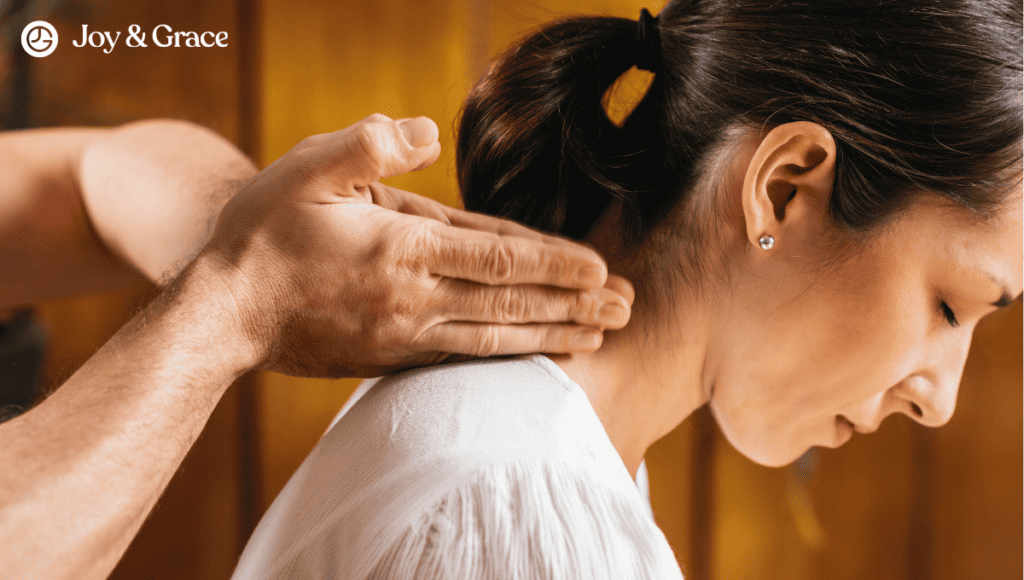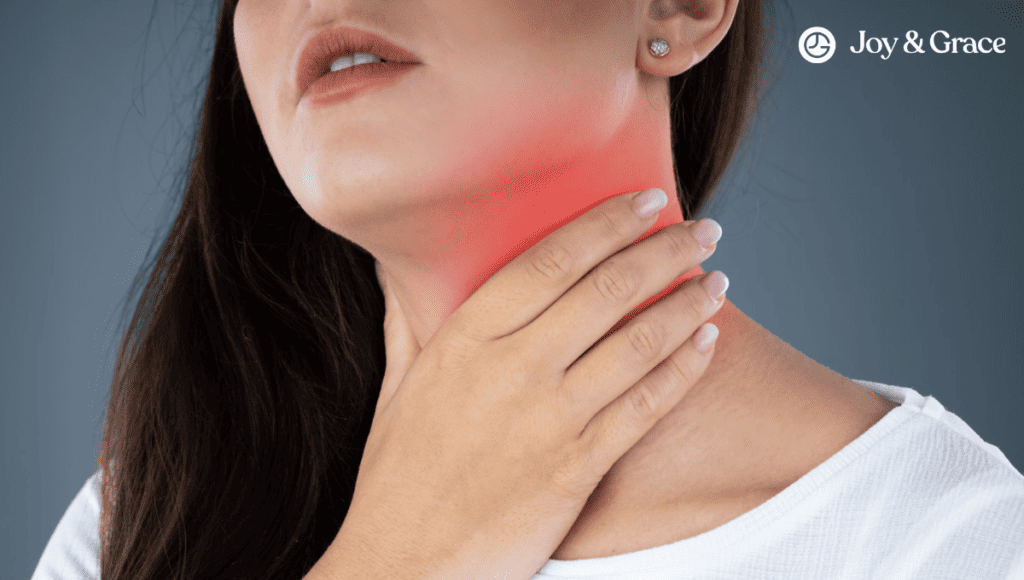How often have you had weird shoulder pain and thought, “Well, this is it; it’s definitely a heart attack this time”?
You’re not alone. It happens to a lot of us.
Sometimes we dismiss it. At other times, it freaks us out so much that we start googling our symptoms, trying to find peace of mind.
After googling, we find articles that say, “Well, it may be a heart attack. Or maybe foot cancer.” Wait, what? How in the world... Perhaps it’s a slight exaggeration, but you get the point.
We’ve all been there, and it’s not a good place to be. Luckily, this website is not that place.
Nevertheless, despite the fact that doctors wrote and reviewed this guide, there is no website that can replace seeing a doctor.
This article will probably give peace of mind to many people with weird shoulder pain, but please keep in mind to treat it as a guide, not medical advice.
Why Do I Have A Random Pain In My Right Shoulder?
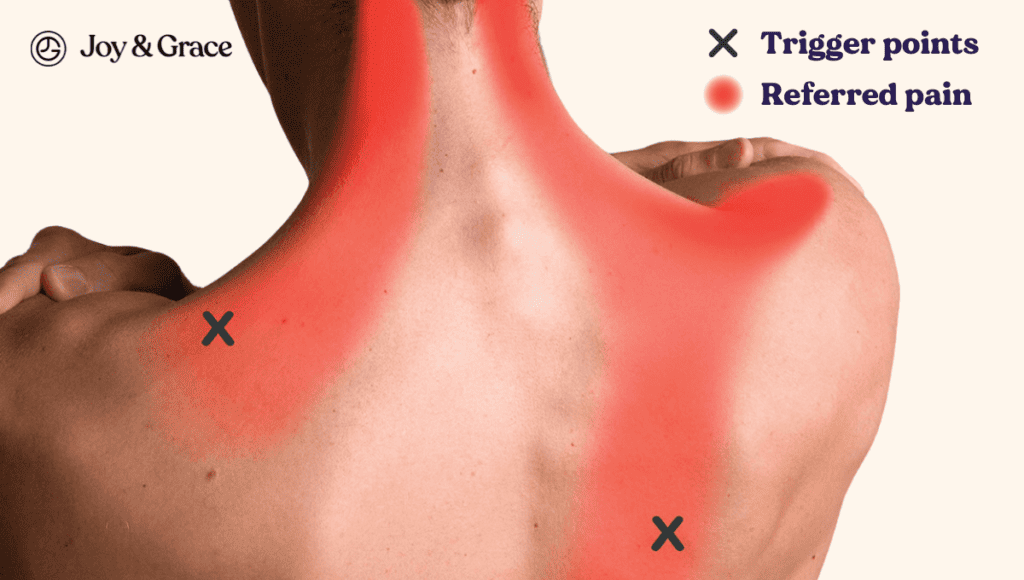
Your routine is the first thing you should consider if you’re experiencing random shoulder pain.
Sometimes, we can hurt our shoulders by bad posture during work or other things and not be aware and forget about it. “Random pain and aches” then usually pursue. Musculoskeletal problems are the main cause of weird and random shoulder pains
If that’s not the case, then:
Shoulder pain that doesn’t get worse by movement, feels random, and/or is hard to explain, is generally not because of any shoulder joint disease.
This type of pain is what doctors call “referred pain.”
Referred pain happens when pain or injury in another part of your body causes pain in another part of your body. There’s no direct irritation/injury of the shoulder present.
The key difference between referred shoulder pain and pain caused by irritation/injury is simple.
In referred shoulder pain, the shoulder can move normally, and moving the shoulder does not change how the pain feels.
Several conditions can cause referred shoulder pain. We will discuss these conditions later.
On the other hand, if you have a random pain that worsens from specific movements, there might be some kind of shoulder injury or irritation present.
Doctors usually exclude the possibility of injury/irritation before considering referred shoulder pain.
Some additional common symptoms of injury or irritation are:
- Stiffness or lack of flexibility,
- Weakness or loss of function,
- Instability, or
- A combination of all these here.
So, to figure out if the pain is caused by an injury or irritation or by referred pain, doctors usually ask more questions, such as:
- When the pain started,
- How long it lasted,
- What made it better or worse,
- How it felt,
- Where it hurt, and
- How it spread.
The doctors usually also ask about activities at work or in their free time that make symptoms worse, like:
- Lifting heavy things,
- Painting,
- Racquet sports, or
- Swimming
As you can see, figuring out what's causing shoulder pain can be challenging and requires careful thought about many different things.
That is why it's essential to see a doctor, especially if your shoulder pain lasts for a long time or worsens.
A doctor can find out what's causing your shoulder pain by getting a complete medical history, giving you a physical exam, and ordering any necessary tests.
Can Shoulder Pain Be A Symptom Of Something Else?
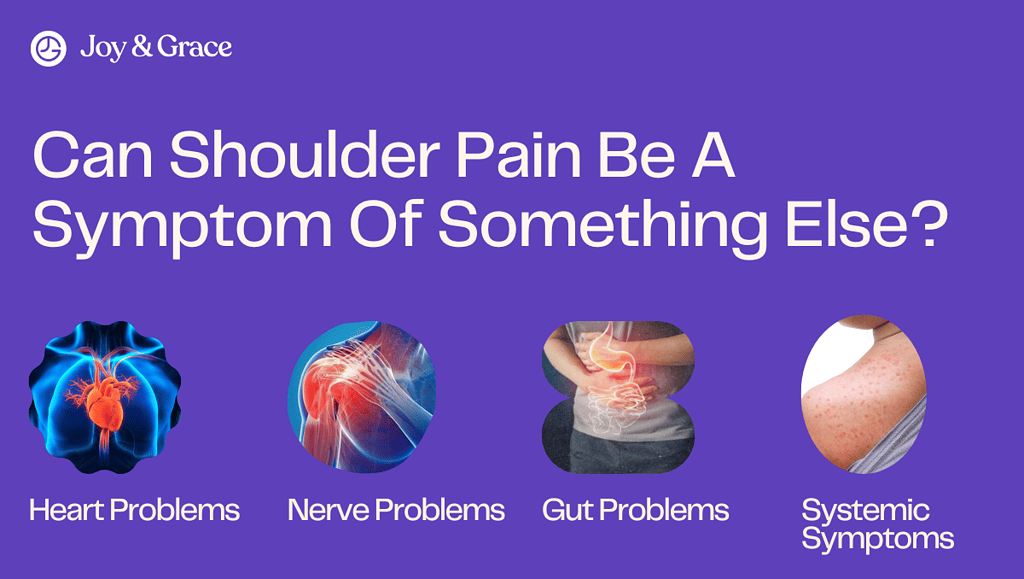
Although not common, shoulder pain can sometimes be a symptom of something else, as we discussed earlier. We mentioned this was called “referred pain.”
Referred shoulder pain can have different kinds of sources.
1. Shoulder Pain Because Of Heart Problems
Shoulder pain could be related to heart problems if chest discomfort is also present.
That is especially true if the discomfort radiates from the chest to the shoulders.
Chest discomfort with shortness of breath (with or without shoulder involvement) that worsens with physical (or mental) activity is a sign of angina pectoris.
Angina pectoris is what doctors call pain for discomfort in the chest caused by heart artery narrowing or complete blockade.
When this happens, the heart muscle does not get enough blood. As a result, chest pain appears as soon as we stress ourselves physically or mentally too much.
If you have angina, your chance of having a heart attack goes up.
Quick Guide To Chest Pain
Even though it's not always clear right away if chest and shoulder pain is caused by a heart problem or something else, some things can help a doctor figure it out. For instance:
- Pain characteristics
People with angina are more likely to feel discomfort in their chests than pain. That can feel like
- squeezing,
- tightness,
- pressure,
- constriction,
- choking,
- burning,
- heartburn,
- fullness in the chest,
- a band-like feeling,
- a “knot in the middle of the chest,”
- a “heavy weight on the chest,” or
- a “bra that is too tight.”
People whose pain is not due to a heart problem often say it is sharp or stabbing.
- Where the pain is felt
Angina pain is usually felt all over the chest, not just in one spot. Angina is less likely if the pain is only on the right or left side and not in the middle of the chest.
- Where the pain spreads
When you have angina, pain often moves to other parts of your upper body. This could be:
- The neck,
- throat,
- lower jaw,
- teeth, or
- shoulders and arms.
Sometimes the wrists, fingers, or back hurt (between the shoulder blades).
- When the pain starts
Angina usually comes on slowly, with the pain worsening over a few minutes. It usually worsens when you work hard and gets better when you rest.
Contrary, pain that isn't from the heart can come and go quickly and feel worse at first. It usually also has nothing to do with work. Pain that isn't from the heart can last for a few seconds or for hours.
It's not likely that you're having angina or a heart attack if you've had the same, steady pain for days or weeks.
- Things that make the pain better or worse
If the pain starts when you do something that makes you work harder, like climbing stairs, having sex, or raking leaves, and it goes away when you rest, it could be angina.
That is because your heart needs more oxygen-rich blood when you work out, but this need goes down when you rest.
Emotional stress, being in the cold, and doing physical activity right after a meal are also things that can make the heart need more oxygen.
If nitroglycerin, a medicine used to treat angina, takes away the pain in a minute or two, it suggests (but doesn't prove) that the problem might indeed be heart-related.
Nitroglycerin may also help with other conditions, like muscle spasms or esophageal spasms.
If the pain goes away every time you eat or take an antacid, it could be a problem with your esophagus or stomach.
In most cases, taking a deep breath or pressing on the area of pain doesn't help with angina. It also tends to be the same no matter how you stand or sit.
You should note the pattern of your symptoms, like what causes the chest pain, how it feels, how long it lasts, and if the medicine helps relieve it.
If your angina symptoms change quickly, come on when you're resting, or start happening in unpredictable ways, call 911. It could be a heart attack.
Not only do the signs of a heart attack vary a lot from person to person, but they may also be very different from the signs of a previous heart attack. "Silent" heart attacks happen when there are no signs or symptoms.
A heart attack can cause more than chest pain, trouble breathing, and feeling sick. You should be aware of the symptoms, which include:
- A feeling of pressure and tightness in the chest
- Pain or numbness in the upper body that moves to the shoulder blades, neck, and jaw.
- Feeling dizzy or fainting
- Dizziness
- Sweating
- Getting pale and cold sweats
In the end, shoulder pain may not be a sign of a heart problem alone, but it's essential to be aware of the other signs and symptoms that could go along with it.
If you have chest pain along with shoulder pain, and if it worsens when you move around, you need to see a doctor immediately.
Early diagnosis and treatment can make the chances of a good outcome much higher.
Your heart health is essential, so don't ignore any signs or wait to see a doctor.
Can Pain In Right Shoulder Be Heart Related?
Strictly, right shoulder pain is usually not heart-related. A variety of other things can cause isolated right shoulder pain before heart problems do.
As we said earlier, heart problems present primarily as chest discomfort.
The discomfort then may (or may not) radiate to the shoulder/s.
That being said, although heart problems more commonly radiate to the left shoulder, they can also radiate to the right shoulder.
In a study among 266 patients who recently had a heart attack, 28.9% reported their chest discomfort also radiated to their right shoulder.
In women in the study, this number was even higher. Among 76 women, 39.5% reported right shoulder involvement.
Still, radiation to the left shoulder was more commonly reported. 50.8% of patients reported left shoulder radiation.
Can High BP Cause Shoulder Pain?
Having high blood pressure (HBP) increases the risk of developing shoulder pain.
That is based on the conclusion of researchers of a study among more than 6,800 participants. In the study, researchers found that:
- People with high blood pressure were almost 30% more likely to develop shoulder pain compared to people who didn’t have high blood pressure. (This also applies to other parts of the body as well.)
- Both bothersome pain and activity-limiting pain were more prevalent in the hypertension group.
- HBP patients, on average, take more medicine for their pain.
Besides shoulder pain, you are also more likely to experience kidney disease, a heart attack, and a stroke if you have high blood pressure.
So, it’s important to know the basics of high blood pressure.
Typically, HBP doesn't cause visible symptoms. This can lead to HBP damaging the organs “silently.”
If you have high blood pressure, the most crucial thing you can do is take any blood pressure medication your doctor or nurse has prescribed.
You shouldn’t stop taking your meds, even if they have side effects. Instead, you should discuss the issues they cause with your doctor or nurse. They might be able to change your medication or lower your dose.
Don’t be ashamed to mention the cost if it's an issue. They might be able to prescribe you a cheaper drug.
Taking your blood pressure medicine could save your life by preventing diseases like heart attacks and strokes.
Furthermore, your ability to control your blood pressure is also considerable. To reduce your blood pressure, you can:
- Get in shape (if you are overweight).
- Pick a low-fat diet high in fruits, vegetables, and low-fat dairy products.
- Cut back on the salt you consume.
- On most days of the week, engage in physical activity for at least 30 minutes.
- Don't drink as much (if you drink more than two alcoholic drinks per day)
Purchasing a home blood pressure meter is also a smart move. People who check their blood pressure at home tend to keep it lower and occasionally even need less medication.
2. Shoulder Pain Because Of Nerve Problems

If the pain is from a neurologic source, it will usually be an occasional sharp pain that radiates from the neck.
Some of the neurologic conditions that can cause referred shoulder pain are:
- Cervical nerve root compression (C5, C6)
Cervical radiculopathy is an issue with the neck that causes the nerves that go to the shoulders, arms, and hands to be pinched or irritated. Most of the time, it only affects one side, but sometimes it can affect both.
Pain in the neck, the shoulder blades, the arm, and sometimes even the hand is a common sign. Depending on the problem, you may feel heavy, weak, or like your arm or hand is tingling.
The “varicella-zoster” virus causes both chickenpox and shingles.
During the first infection, the virus causes chickenpox - varicella.
The virus then stays dormant in the nerves after the first infection.
Its reactivation causes shingles (painful rash) - zoster.
One of the places where the rash could appear is the shoulder area. And people often feel pain, itching, or tingling in the area where the rash will show up before it does.
This causes a perfect combination of weird shoulder pain without any apparent reason.
A few days later, though, the rash usually shows up.
There are also reports of shingles causing complete shoulder weakness, although it is a rare complication of shingles.
Is A Weird Pain In Shoulder A Sign Of A Stroke? Which Arm Hurts During A Stroke?
Although the symptoms of a stroke differ for each person, sole arm (or shoulder) pain is not a symptom of a stroke. (Shoulder pain after a stroke, on the other hand, is very common.)
As we’ll explain just in a bit, although arm (shoulder) dropping and weakness are one of the symptoms of a stroke, these are usually accompanied by additional symptoms.
Furthermore, symptoms of a stroke happen very quickly and in an alarming manner.
Regarding the other question, any arm (including the shoulder) can hurt during a stroke.
Since different parts of your brain control different parts of your body, your symptoms will depend on which part of your brain is hurt and how badly.
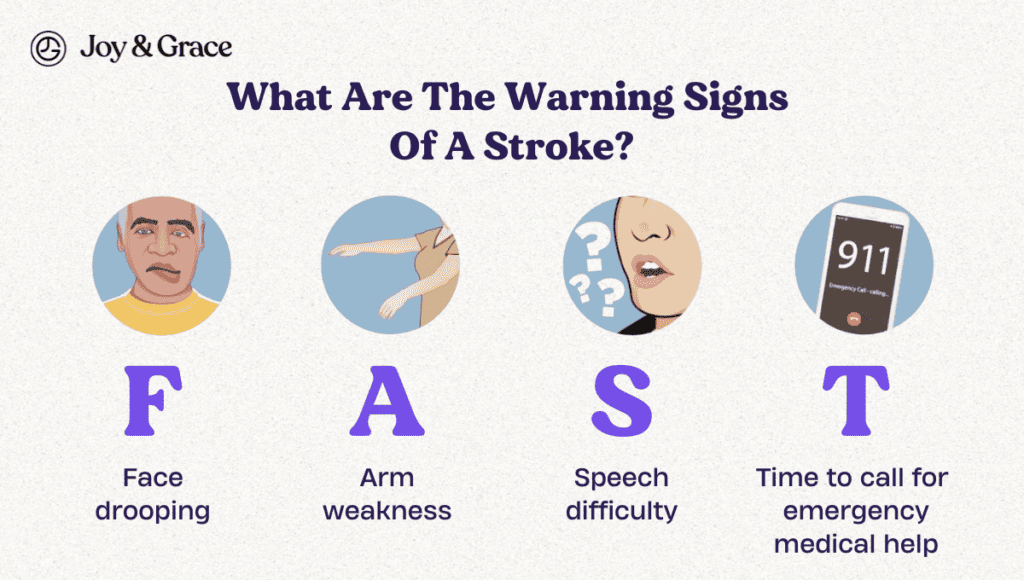
To go back to stroke symptoms, a short acronym is quite helpful. The word FAST can help you remember the main symptoms of a stroke:
- F - Face:
One side of the person's face may have dropped, they may not be able to smile, or their mouth or eye may have drooped.
- A - Arms:
If one arm is weak or numb, it may drop, and the person might be unable to lift it. Instructing someone to lift both shoulders reveals which arm is affected.
- S - Speech/Stability:
Both speech and stability are part of the letter “S” of the FAST acronym.
In people during a stroke, their speech may be slurred or jumbled, or they may not be able to talk at all, even though they look awake. They may also have trouble understanding what you're saying to them.
As for stability, people will sometimes fall, feel very dizzy, or be unable to stand on their own. Stroke symptoms can include difficulty with balance, having trouble walking, and losing coordination.
- T - Time:
As for time, if you notice any of these signs or symptoms, it's time to call an ambulance right away.
Some other guidelines use the longer acronym FASTER. Although vastly similar, there are some slight changes to the shorter FAST version:
- F and A stand for the same words as in the FAST acronym (face and arms).
- The letter S refers solely to stability.
- The letter T is associated with talking (in the FAST acronym, this is included under the letter S, as speech).
- E is additionally referred to as the eyes, explaining visual changes during a stroke. These sudden vision changes can include total blindness in one eye, double vision, or partial blindness in one or both eyes.
- Finally, the letter R is associated with the word react, which is synonymous with the word time in the FAST acronym.
Other Potential Stroke Signs
Symptoms in the FAST (or FASTER) test identify most strokes, but occasionally a stroke can result in different symptoms.
Other warning signs and symptoms could be:
- Complete paralysis of one side of the body,
- Difficulties swallowing (dysphagia),
- A sudden, intense headache that causes severe pain never felt before (“Worst headache of my life”), and
- Passing out.
However, these symptoms could also have other causes.
3. Shoulder Pain Because Of Gut Problems
If there’s very poorly localized shoulder pain, with a normal shoulder examination, it could originate from the abdomen.
This is because there are shared nerve pathways between the shoulder and abdomen. When organs in the abdomen become irritated, the brain may interpret the pain signals as originating from the shoulder.
What Organ Can Cause Right Shoulder Pain?

Lesions in the liver, gallbladder, or duodenum can sometimes present as right shoulder pain. Another organ that can (although rarely) cause right shoulder pain is the uterus.
The lesions (uterus included) first irritate the diaphragm, which refers to shoulder pain.
Some of the conditions that can cause referred shoulder pain are:
- Gallbladder stones,
- Stomach ulcers,
- Liver cysts,
- Spleen injuries,
- Diaphragmatic endometriosis,
- Ruptured ectopic pregnancy, etc.
These conditions present with additional symptoms most of the time. Isolated shoulder pain is infrequent.
4. Shoulder Pain With Systemic Symptoms
Having symptoms all over the body besides shoulder pain makes it more likely that it is caused by something else:
- A fever could mean you are on the verge of a viral infection. In most cases, other joints also hurt. Some types of arthritis sometimes also present as joint (shoulder) pain, stiffness, and fever.
- Severe and progressive muscle pain is a sign of polymyositis which can affect the shoulders and most body muscles.
The main culprits behind polymyositis are inflammation and irritation of the muscles. All of the body's muscles are susceptible. The exact cause of polymyositis is not known.
Ages 31 to 60 are the most common range for occurrence. People under the age of 18 rarely experience it.
- Rashes after sun exposure are seen in conditions like dermatomyositis and lupus. In addition to causing rashes, they also affect the joints (shoulders included). The difference between polymyositis and dermatomyositis is that, besides affecting several muscles, dermatomyositis also causes a rash. Additionally, it can also affect children. (We have a comprehensive guide about rashes and shoulder pain if you want to read more.)
Still, this is a small list of conditions where the shoulder pain could be a symptom of something else.
Things are not always this straightforward. Still, most of the time, there’s no severe disease behind the shoulder pain.
To give yourself peace of mind, a visit to the doctor would remain our ultimate recommendation.
Takeaway
To sum everything up:
- Most random shoulder pains are due to bad posture or other things recently hurting our shoulders, which we’re unaware of or have forgotten about.
- If we can move our shoulders normally, and the pain doesn’t get worse, the shoulder itself is usually not the culprit. In this case, the shoulder pain could be a “referred” pain from another part of the body.
- Weird shoulder pains caused by nerve problems usually feel like an occasional sharp pain that radiates from the neck. In some cases, weird pain may be a symptom of a shingles rash that will soon be visible. Strokes can affect any of the shoulders, but they also present with more severe symptoms.
- Heart problems mostly present as chest discomfort, not isolated shoulder pain. The discomfort then may or may not radiate to the shoulders. The right shoulder can also be affected by heart problems, not just the left shoulder. It is essential to know how heart problems typically present.
In addition to being a risk factor for strokes and heart attacks, high blood pressure also increases the risk of developing shoulder pain. High blood pressure should be closely monitored, as it may cause “silent” damage to the organs. - Gut problems present as a very vague pain, usually in the right shoulder.
- If the shoulder pain is accompanied by fever or additional pain in other joints, it may have a systemic cause. Viral infections and rheumatoid arthritis are some of the conditions presenting in this form.
To come back to our first talking point: “Is my weird shoulder pain a heart attack?” Well, probably not. And in most cases, the pain is nothing to worry about.
We hope this guide has answered (at least some of) your questions. But, as always, our ultimate recommendation is to visit a doctor. Nothing can give you peace of mind like a visit to the doctor does.
See you in the next article, weird-shoulder-pain-probably-not-because-of-heart-problems sufferer!










